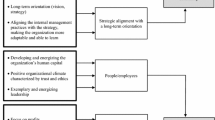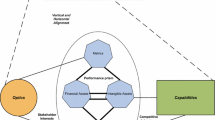Abstract
This paper describes a set of ideal type organizations in a developmental sequence. As these descriptions are based on Spiral Dynamics (or Emerging Cyclical Levels of Existence Theory – ECLET), the types are labeled as Order, Success, Community and Synergy. Per type the author elaborated on the underlying value system and relating institutional structures, such as leadership role, governance and measurement format. As a summary, a Transition Matrix is presented which indicate the paradigm shifts per discipline/department, as manifested in the subsequent ideal type organizations. As Order and Success generally describe the majority of corporations in Western Economies, the latter two types introduce new approaches to more innovative – and more sustainable/responsible – ways to doing business. Based on Community Values, the author introduces a new measurement format which is the foundation for a systemic and coherent set of management tools to be used in a stakeholder approach. These tools relate to the strategic, tactical and operational tasks of management and have been developed by researchers of the European Corporate Sustainability Framework (ECSF) consortium. The set includes two tools which are generic: the Strategic Sustainability Scan (Strategy) and the Sustainability Matrix, which is a self-assessment tool (tactics). Three operational tools are context and industry specific: These are the Community related Responsive Business Scorecard (RBS) and Benchmark Format for measuring and monitoring sustainability performance and a methodology – a Management Information System – to generate information on people, planet and profit in order to provide data for the set of key performance indicators.
Similar content being viewed by others
References
Beck, D. and C. Cowan: 1996, Spiral Dynamics (Black-well Publishers).
Brink, T. van den and Woerd, F. van der: 2004, 'Industry Specific Sustainability Benchmarks: an ECSF Pilot bridging Corporate Sustainability with Social Responsible Investments',: Journal of Business Ethics Forthcoming.
Collins, J. C. and J. I. Porras: 1997, Built to Last. Successful Habits of Visionary Companies (New York: Harper-Collins Publishers).
Davies 1967, Organizational Behavior.
Hardjono, T. W.: 1995, Ritmiek en Organisatiedynamiek: Vierfasenmodel (Kluwer).
Hardjono, T. W. and Klein P. de: 2004, 'General Introduction to the European Corporate Sustainability Framework', Journal of Business Ethics Forthcoming.
Jaworski, J.: 1996, Synchronicity, the Inner Parth of Leadership (Berret-Koehler, San Francisco).
Kaplan, Robert S. and David P. Norton: 1996, The Balanced Scorecard: Translating Strategy into Action (Harvard Business School Press).
Klein, B.M.: 1977, Dynamic Economics, Harvard University Press.
Marrewijk, M. van and T. W. Hardjono: 2001, 'The Social Dimensions of Business Excellence', Corporate Environmental Strategy, 8(3).
Marrewijk, M. van: 2002, Concepts and Definitions of Corporate Sustainability, Journal of Business Ethics 44(2-3), 95-105.
Marrewijk, M. van and M. Were: 2002, 'Multiple Levels of Corporate Sustainability', Journal of Business Ethics, 44(2-3), 107-119.
Marrewijk, M. van and T. W. Hardjono: 2002, 'European Corporate Sustainability Framework for Managing Complexity and Corporate Change', Journal of Business Ethics, 44(2-3),121-132.
Marrewijk, M. van and J. Timmers: 2002, 'Human Capital Management', Journal of Business Ethics, 44(2-3), 171-184.
Marrewijk, M. van: 2002, 'European Corporate Sustainability Framework', International Journal of Business Performance Measurement, 5(2-3).
Marrewijk, M. van, W. DeCleyn, I. Wuisman, V. Pan-apanaan and L. Linnanen: 2004, 'A Developmental Approach to Business Excellence', Journal of Business Ethics Forthcoming.
Marrewijk, M. van: 2004, 'The Social Dimension of Organizations: Recent experiences with Great Place to Work_ assessment Practices', Journal of Business Ethics Forthcoming.
Marrewijk, M. van and H. M. Becker: 2003, 'The Hidden Hand in Cultural Governance: The Case of Humanitas' Ten Year Period of Transformation', Journal of Business Ethics Forthcoming.
Maslow, A.: 1982, Toward a Psychology of Being (Van Nostrand Reinhold).
Schumpeter, J. A.: 1942, Capitalism, Socialism and democracy, New York: Harper & Brothers.
Wempe, J. and M. Kaptein: 2002, The Balanced Company. A theory of Corporate Integrity (Oxford University Press).
Wilber, K.: 2000, A Theory of Everything: An integral vision for Business, Politics, Science and Spirituality (Shambhala).
Wilber, K.: 1995/2002, Sex, Ecology, Spirituality: The Spirit of Evolution (Shambhala).
Woerd, F. van der and Brink, T. van den: 2004, 'Feasibility of a Responsive Business Scorecard-a pilot study', Journal of Business Ethics Forthcoming.
World Business Council for Sustainable Development WBCSD: 1999, Meeting Changing Expectations. Corporate Social Responsibility (New York: WBCSD).
World Business Council for Sustainable Development WBCSD: 2000, Corporate Social Responsibility: Making Good Business Sense (Geneva: WBCSD).
Author information
Authors and Affiliations
Rights and permissions
About this article
Cite this article
van Marrewijk, M. A Value Based Approach to Organization Types: Towards a coherent set of stakeholder-oriented management tools. Journal of Business Ethics 55, 147–158 (2004). https://doi.org/10.1007/s10551-004-1898-6
Issue Date:
DOI: https://doi.org/10.1007/s10551-004-1898-6




